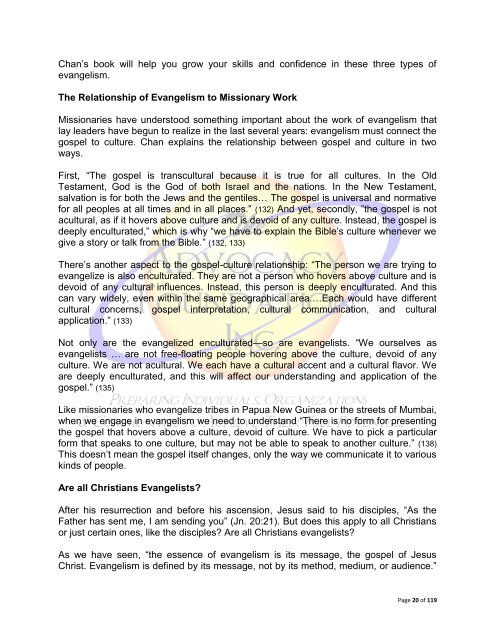International Legal Evangelism: Intelligence, Reconnaissance & Missions
International Legal Evangelism: Intelligence, Reconnaissance & Missions
International Legal Evangelism: Intelligence, Reconnaissance & Missions
Create successful ePaper yourself
Turn your PDF publications into a flip-book with our unique Google optimized e-Paper software.
Chan’s book will help you grow your skills and confidence in these three types of<br />
evangelism.<br />
The Relationship of <strong>Evangelism</strong> to Missionary Work<br />
Missionaries have understood something important about the work of evangelism that<br />
lay leaders have begun to realize in the last several years: evangelism must connect the<br />
gospel to culture. Chan explains the relationship between gospel and culture in two<br />
ways.<br />
First, “The gospel is transcultural because it is true for all cultures. In the Old<br />
Testament, God is the God of both Israel and the nations. In the New Testament,<br />
salvation is for both the Jews and the gentiles… The gospel is universal and normative<br />
for all peoples at all times and in all places.” (132) And yet, secondly, ”the gospel is not<br />
acultural, as if it hovers above culture and is devoid of any culture. Instead, the gospel is<br />
deeply enculturated,” which is why “we have to explain the Bible’s culture whenever we<br />
give a story or talk from the Bible.” (132, 133)<br />
There’s another aspect to the gospel-culture relationship: “The person we are trying to<br />
evangelize is also enculturated. They are not a person who hovers above culture and is<br />
devoid of any cultural influences. Instead, this person is deeply enculturated. And this<br />
can vary widely, even within the same geographical area.…Each would have different<br />
cultural concerns, gospel interpretation, cultural communication, and cultural<br />
application.” (133)<br />
Not only are the evangelized enculturated—so are evangelists. “We ourselves as<br />
evangelists … are not free-floating people hovering above the culture, devoid of any<br />
culture. We are not acultural. We each have a cultural accent and a cultural flavor. We<br />
are deeply enculturated, and this will affect our understanding and application of the<br />
gospel.” (135)<br />
Like missionaries who evangelize tribes in Papua New Guinea or the streets of Mumbai,<br />
when we engage in evangelism we need to understand “There is no form for presenting<br />
the gospel that hovers above a culture, devoid of culture. We have to pick a particular<br />
form that speaks to one culture, but may not be able to speak to another culture.” (138)<br />
This doesn’t mean the gospel itself changes, only the way we communicate it to various<br />
kinds of people.<br />
Are all Christians Evangelists?<br />
After his resurrection and before his ascension, Jesus said to his disciples, “As the<br />
Father has sent me, I am sending you” (Jn. 20:21). But does this apply to all Christians<br />
or just certain ones, like the disciples? Are all Christians evangelists?<br />
As we have seen, “the essence of evangelism is its message, the gospel of Jesus<br />
Christ. <strong>Evangelism</strong> is defined by its message, not by its method, medium, or audience.”<br />
Page 20 of 119

















